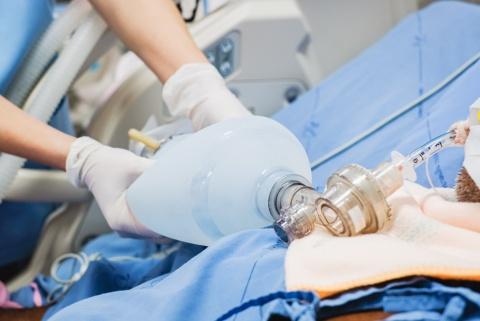
Photo above: Intubated patient receives oxygen
The emergence of the highly infectious SARS-CoV-2 virus posed a new challenge to caring for trauma patients in the intensive care unit (ICU). At the onset of the COVID-19 pandemic, trauma surgeons faced a serious dilemma: how do you protect these highly vulnerable patients from the virus while also protecting your colleagues on the front lines?

intensive care unit (ICU)
In addition to treating a new surge of patients with acute symptoms from COVID-19, trauma ICUs still need the capacity to treat patients requiring emergency care for severe injuries, strokes, heart attacks, and drug overdoses while also performing emergency general surgery cases, such as appendectomies and gall bladder removals. Because of the immediacy of care required, identifying positive COVID-19 cases as soon as possible is critical to ensure timely care for these patients.
“It’s challenging because we can’t screen our patients for COVID-19 since many of them are unconscious," says Dr. Amy Alger, Co-Medical Director of the COVID-19 intensive care unit (ICU). "We just have to assume they have the virus and wear PPE [personal protective equipment]. Thankfully, we have the point-of-care test.”
With the rapid, point-of-care test, trauma surgeons can test for COVID-19 at the patient’s bedside and obtain results within 15 minutes, enabling patients to receive more timely care. This window of time is critical because in a life and death situation, every second counts.

Assistant Professor of Surgery, Department of
Trauma, Acute, and
Critical Care Surgery
“We do the rapid COVID-19 testing in the emergency department right when they get there,” says Dr. Krista Haines, Assistant Professor of Surgery, Department of Trauma, Acute, and Critical Care Surgery. “I think that helps with saving us PPE because once we know patients test negative, we don’t have to do as much gowning and gloving. It helps with everyone’s disposition. It helps with when we go into the OR and what equipment we need as opposed to everyone having a powered air purifying respirator (PAPR) on and full PPE for every single case.”
Many trauma patients learn about their COVID-19 diagnosis in the emergency department. This early diagnosis means the care team can provide the appropriate treatment before symptoms get worse. Rapid COVID-19 testing also allows the team to enroll patients with early disease into clinical trials for vaccines and therapeutics since their symptoms are mild.
"I think learning to live with COVID-19 is important, instead of just waiting for it to go away."
-Dr. Krista Haines, Assistant Professor of Surgery, Department of Trauma, Acute, and Critical Care Surgery
The COVID-19 pandemic has significantly disrupted the team’s usual processes for treating patients in the ICU. Because team members have to assume that every patient who comes into the emergency department is COVID-19 positive, PPE must be rapidly deployed at a moment’s notice.
“We've set up a huge, locked safe box of COVID-19 PPE that has equipment for all of our residents, all of our attendings. Everything is right outside the trauma bay so as soon as somebody comes in, if they're not able to talk to us, we just assume they have COVID-19,” says Dr. Haines. “We're all properly protected, and we can treat the patient as fast as possible without any delays when they show up in the trauma bay.”
To facilitate this process even further, Dr. Haines says two attendings volunteered to perform all tracheotomies since putting an airway in a patient carries a high risk of virus transmission. The incision into the airway scatters a high concentration of aerosolized virus particles.
“They took it upon themselves to say ‘we're the ones who are going to do this’ and they've perfected it to where they do it very quickly and safely for the patients and for all of their partners. They're pretty amazing.”
While the level of care in the ICU is improving and people leave the ICU at a higher rate, Dr. Haines says it’s critical that people wear masks and try to protect themselves to stop the virus from spreading. “I think learning to live with COVID-19 is important, instead of just waiting for it to go away.”
Give to Duke Surgery
A gift to the Department of Surgery is a gift of knowledge, discovery, and life.